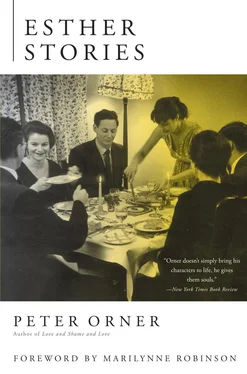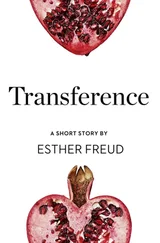IN THE DARK she lights a match. She looks at herself in the reflection in the window. The flame is jumpy and fickle because she’s breathing on it. Yet it stays lit until it burns down to her fingers, and she watches herself in the uncertain light and sees a face too large and blanched, like an unwelcome moon. The house so still and mute even the kitchen clock’s terrible grinding is muffled. She’s downstairs in the new room, the TV room, the room they remodeled in the fifties. Walt’s upstairs muttering snores like a sea cow. It’s two o’clock in the morning and she whispers something even she can barely hear: “What for?” What her mother used to say, first thing she ever said in the mornings, even before her father got sick, as though asking it of God. “What for? You tell me what for?” Her mother who died of grief for a daughter who only ran away down the block. But why now? Why Sarah asking? She thinks of Rhoda’s tiny munching lips at her nipples, remembers those grabby little hands — in this very room — all that need. And now? It isn’t that. She doesn’t want that need back. It’s some other more undefined ache. Something else, like being haunted by the dying light of the match, by her love, by her desire even now to knead Walt’s skin, even now to whisper in his sleeping ear — what? — that she’s here, that Sarah’s here, whisper, I’m here, I’m here. Because so much is occurring to her tonight and she can’t sleep while the house drowses. Sarah lets the silence soak her into its blur, as if she were descending slowly through water. But she’s never in her life been capable of whispering, of capturing a windless moment, and she fears he doesn’t know this about her, that she can simply sit, in the dark, the radio off, and can, yes, can, consider that her life with him has been exactly that, a life, and life’s not something you measure in good or bad. Her life with Walt a life — and if she could simply say — but that’s not it either. He wouldn’t want to hear about it, would shrug her away. “Whatayou talkin? Sarah? Whatayou talkin?” No, she would like to do it with a look that doesn’t need explanation or interpretation, but instead would simply make him remember. He’s such a writer down of things, such a clutcher of nonsense; the man has files of pictures of furniture, of tables and chairs he sold thirty years ago, stuff already on a dump heap — but there are so many things he doesn’t remember, because he never thought about them when they were happening. A year and a half ago now his brother Leon died in her arms because his wife, Bets, couldn’t bear it any longer, and when Walt came into that white room he didn’t look at his brother. He looked at Sarah — pleaded with her, as if she were suddenly the God with answers her mother was always talking to — and he doesn’t remember, because he wasn’t there when it was happening, and even now, when he rambles on about himself and Leon making illegal whiskey in a cowshed — as if Fall River ever had a cowshed in the past hundred years, as if he ever drank illegal whiskey — it’s so he won’t remember anything he really remembers about a brother dying before him. Love, isn’t it enough to describe? What for? Remember you holding me and me holding your dead brother and your eyes searching mine for some answer and me giving the only answer I knew how to give, which was to grip both of you, the living and the dead, and then, yes — you won’t remember this because you weren’t there when it was happening. I dropped him on the pillow and gripped you harder, and you dug your head into the nook of my shoulder and you wept no. Your brother who died too young because he went to Florida, state full of nothing but oranges and corpses; the man should have known, you said — I dropped him on the bed and gripped you and you wept no and you’ll never remember.
SARAH COMES HOME for lunch after her volunteer shift at the register in the hospital gift shop and finds Walt dead on the floor of their bedroom. He has been dead for at least two hours. His second and last heart attack, and from this one there was no turning back. The man turned fifty-nine only three months ago. This is September 1975. It has been a long morning, Friday mornings always are, and Sarah’s feet hurt. She kneels beside his body and lifts his wrist to check for his pulse, even though she knows from looking at him. She knows. The way she knows it’s morning through the thick drapes of a strange hotel room. The way she knows it’s bad news by the way the phone rings mid-ring. Walt is dead. He is too young. He is dead. He is on his back with his suit pants on, sprawled, as though he went with fight. He clutches his wallet in his left hand. His teeth are still good and white. His shoes are polished. His tie is crooked, but tight and confident up to his big Adam’s apple. He could be a toppled wax statue. He’s wearing his watch. His hands are not clammy. He’s wet himself. But still, he could be sleeping on the floor. He could be napping. He could have fallen, tripped, knocked his head against the telephone table and conked himself out. She rests an ear on his chest, not to listen for any movement of his dead exploded heart, but because she is suddenly so weary and he has been her fat pillow all these years. Though she doesn’t want to sleep. She wants to rest awake. She sits up and takes off her shoes, then settles her head on his chest again, on his blue sea horses tie, on his sprawl. It isn’t comfortable because of the angle, but she doesn’t adjust. She remains still and listens to her own breathing. A bit quickened, but not hysterical, nothing even close to that. Other women, she thinks, would get hysterical. Run around moaning, dial telephone numbers furiously, shriek. The fools, she thinks, showy fools. Dingbats, Walt would call them. Dingbat chickens bawk-bawking. Walt, she thinks, too many sirloins at the Magoni’s in Somerset. How many Howard Johnson hot dogs on a buttered bun? Ate, ate, ate like a happy hog across your life, and now I’m here. I could murder your head. You want to see tears? You want them to drop on your shirt so you can feel them on your skin? Didn’t I tell you that time in Atlantic City that you waddled like an old man, that you needed to rest too much. You couldn’t walk the boardwalk without getting so tired, and now look at you, Walt, can’t even make it to work. That time in Atlantic City you laughed at me and said who the hell needs walking anyway. Bought us both another double cone. Pounded your chest and said, You got to live while you live. And that was all well and good for you. You don’t have to come home to you like this. I have to come home to you. Walt. Atlantic City. Why Atlantic City now? That time in Atlantic City with Bernie and Nina Sadow. You on the beach. The only one of us who’d swim. Bernie had some kind of skin condition. Who knew with that man. It was always something. And God, that Nina. Didn’t stop talking to take a breath the three days we were down there. About what? You said you never heard so much nonsense since Saul Graboys talked you into buying his lemon El Dorado. But you swam, darling. Bernie with his skin condition and his chain of what? Check-cashing stores? Wasn’t that it? Didn’t Bernie Sadow own a chain of check-cashing stores in Newark? What a business to be in, no wonder he had a skin condition. You splashing and shouting at us. I stayed on the beach because I couldn’t escape Nina’s mouth. Bernie sitting there bundled up like it was February in Warsaw, and you, my fat brave knight, my tub-a-lard warrior, in the water splashing, throwing a tennis ball to those shouting boys. Those boys leaping out of the water like pale white porpoises. You swam with those boys. Why Atlantic City now? We haven’t spoken to Bernie and Nina Sadow in how many years? You came back and shook your hair at us girls and said to Nina, Stop jabbering, woman. Stop! Come on, deadbeats, it’s the Fourth of July in Atlantic City! Nina wanted to go back to the hotel and play cards. Bernie didn’t want to do anything but tell strangers on the beach about all his ailments, that straw hat pulled down to his eyes, that huge coat, those big sunglasses. You said he looked like your Russian great-aunt escaped from the shtetl, Aunt Portia Bertobobovitch. At least that got a smile out of Bernie, but Nina barely heard it over her own blather, except to say to me, Oh, your Walt’s so hysterical. He’s really got to be the most hysterical of all the husbands. Of all the husbands, she said, and for once, even though she went right back to complaining about the food at the hotel, for once that blathering woman had an ounce of wisdom. You said, Bernie, my big Polish babushka. And Bernie said, I thought you said I was Russian. Because Bernie had a sense of humor, which was more than you could say for Nina. And you said, Poland, Russia, it all looks the same to a Jew on the run, and Bernie, who was sensitive and serious on that point, didn’t laugh, only said, Indeed. And later in the hotel you stood up on the bed with Q-tips sticking out your ears and mimicked Bernie’s indeed. Indeed, indeed, indeed — who does he think he is, the queen’s mother? Because Bernie was always finding new ways to remind people that he went to Harvard. But check cashing? Harvard College, Harvard Yard, and that’s how he ended up making a living? Oh my lovely, my lovely, my lovely.
Читать дальше












